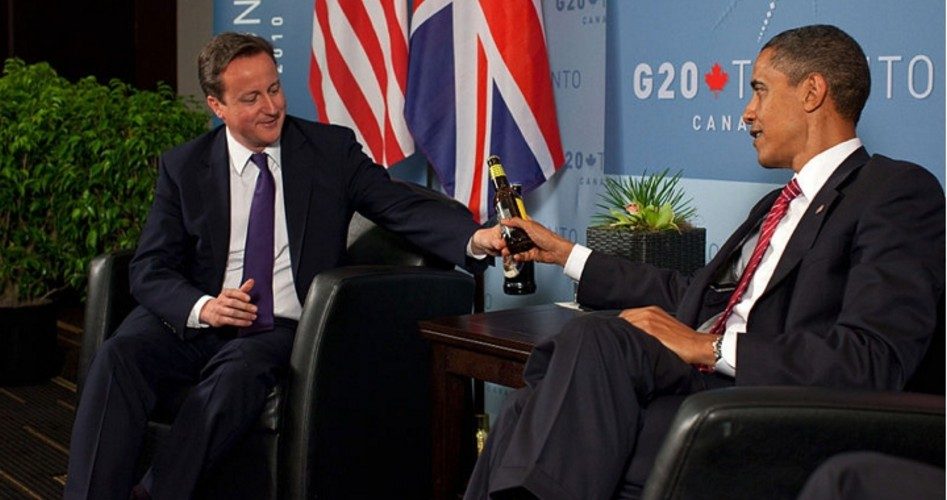
In an interview with Jeffrey Goldberg of The Atlantic published in the magazine’s April issue, (in a section headed “How France and Great Britain contributed to the mess in Libya”) President Obama criticized U.K. Prime Minister David Cameron (shown on left) for being too distracted to prevent Libya from becoming “a mess.”
“When I go back and I ask myself what went wrong,” Obama told Goldberg, “there’s room for criticism, because I had more faith in the Europeans, given Libya’s proximity, being invested in the follow-up.”
Obama noted during the interview that Nicolas Sarkozy, the French president, lost his job the following year. He then delivered the words that have so irritated British journalists, stating that British Prime Minister David Cameron soon stopped paying attention to events in Libya, becoming “distracted by a range of other things.”
Firing back at Obama’s comments on March 11, Britain’s Times newspaper described Obama’s criticism as “extraordinary” and said Obama was blaming Cameron for the “Libya mess.”
Britain’s Independent carried a front-page headline reading: “Obama savages Cameron over Libya.”
In an apparent effort to mollify British citizens upset by Obama’s remarks, NSA spokesman Edward Price said to Britain’s ITV News:
Prime Minister Cameron has been as close a partner as the president has had, and we deeply value the UK’s contributions on our shared national security and foreign policy objectives which reflect our special and essential relationship.
A report on the controversial interview in The Independent noted that both Cameron and Nicolas Sarkozy, who was then the French president, had pressed strongly for the bombing raids on Libyan dictator Moammar Gadhafi’s forces that resulted in his fall from power, but since 2011 Libya has descended further into violence and civil war, and has recently become a stronghold for ISIS in North Africa.
In the Atlantic article, entitled “The Obama Doctrine,” Goldberg wrote that when Obama said that Libya is “a mess,” he was softening his usual, more coarse, language:
Mess is the president’s diplomatic term; privately, he calls Libya a “shit show,” in part because it’s subsequently become an ISIS haven — one that he has already targeted with air strikes. It became a shit show, Obama believes, for reasons that had less to do with American incompetence than with the passivity of America’s allies and with the obdurate power of tribalism.
The Independent played up Obama’s terminology big time, only provoking the readers’ curiosity by spelling it “s**** how” in its headline for the story. And while The Independent and other papers such as the Washington Post focused principally on Obama’s criticism of Cameron, there were much more significant revelations found in the Atlantic article.
Of particular interest was the article’s discussion of events related to Benghazi, Libya. The once little-known city of Benghazi has become a household word since Islamic militants on September 11, 2012, killed U.S. Ambassador J. Christopher Stevens, U.S. Foreign Service Information Management Officer Sean Smith, and former Navy SEALS Tyrone Woods and Glen Doherty at the U.S. diplomatic compound there. Following that attack, much criticism was directed at former Secretary of State Hillary Clinton for her department’s failure to provide adequate security at the facility. Though Clinton initially took responsibility for the security failure, in her January 2013 testimony before Congress, she claimed security decisions at the Benghazi compound had been made by others, stating, “The specific security requests pertaining to Benghazi … were handled by the security professionals in the [State] Department. I didn’t see those requests, I didn’t approve them, I didn’t deny them.”
A March 15 Fox News report noted that Clinton has committed what it described as a “gaffe” when she said at an Illinois town hall that the United States “didn’t lose a single person” in Libya during her time as secretary of state. Fox reported:
Clinton made no mention of the Sept. 11, 2012 terror attack on the U.S. consulate in Benghazi, Libya that killed four Americans: U.S. Ambassador Chris Stevens, information officer Sean Smith, and former Navy SEALS Tyrone Woods and Glen Doherty.
In his article, Goldberg reported that the stated purpose of the Obama administration’s intervention in Libya in 2011 was to prevent Gadhafi from following through on his threats to slaughter the people of Benghazi. Presumably based on Obama’s recollection of the events, the article stated that the president did not want to get involved in Libya and had been counseled by Vice President Joe Biden, his first-term Secretary of Defense Robert Gates, and other advisors, to avoid intervening.
However, other administration members, including Clinton, then-UN Ambassador Susan Rice, Samantha Power, Ben Rhodes, and Biden’s national-security advisor, Antony Blinken, pushed hard to protect Benghazi, and their argument prevailed. (Both Rice and Blinken were members of the interventionist Council on Foreign Relations.)
Goldberg quoted Biden’s private statement regarding Clinton’s foreign policy views: “Hillary just wants to be Golda Meir.”
In hindsight, Obama now says about the intervention: “It didn’t work.”
But back in 2011, though he felt compelled to go into Libya, he did not want to go it alone, so he did what George W. Bush did before invading Iraq: He went to the UN.
Of course, the Constitution gives the power to declare war to Congress, but other presidents from Harry Truman to Bush have surrendered that sovereign power to the UN.
As Obama explained his actions:
So what I said at that point was, we should act as part of an international coalition. But because this is not at the core of our interests, we need to get a UN mandate; we need Europeans and Gulf countries to be actively involved in the coalition; we will apply the military capabilities that are unique to us, but we expect others to carry their weight. And we worked with our defense teams to ensure that we could execute a strategy without putting boots on the ground and without a long-term military commitment in Libya.
So we actually executed this plan as well as I could have expected: We got a UN mandate, we built a coalition, it cost us $1 billion — which, when it comes to military operations, is very cheap. We averted large-scale civilian casualties, we prevented what almost surely would have been a prolonged and bloody civil conflict. And despite all that, Libya is a mess.
Obama said that he has looked back to figure out what went wrong in Libya. However, he should realize that what went wrong was what usually goes wrong when our military intervenes overseas, whether it be Vietnam, Iraq, or Libya. We not only fail to have what military experts usually state are essential requirements for a military operation: clear-cut objectives and an exit strategy, but by intervening in a place where we do not understand the political dynamics, we tend to destabilize the region and allow forces to take over that are worse than the dictators we set out to topple. These bad experiences should have warned us against setting out on yet another bad operation, our quest to topple Bashar al-Assad in Syria, where our aid to the anti-Assad rebels helped to strengthen ISIS.
As we noted in an article last December, NATO’s war on Libya resulted in turning over “the entire armory of an advanced industrial state to the region’s most sectarian militias: groups such as the Libyan Islamic Fighting Group, Al Qaeda in the Islamic Maghreb, and Boko Haram.” (This information originated with a report released by Global Terrorism Index, a project of the Sydney, Australia-based Institute for Economics and Peace. The results of the report were cited in an article by freelance writer Dan Glazebrook originally published by RT on November 27, 2015, and reprinted with permission the next day by the Ron Paul Institute for Peace and Prosperity.)
In another article last December, The New American reported that ISIS is now gaining strength in Libya. In that article, we observed:
The situation in Libya in many ways resembles that of Iraq and Syria, where U.S. intervention toppled one strongman who served as a buffer against radical terrorism of the type engaged in by ISIS and al-Qaeda and has supported rebel factions attempting to overthrow another one.
Libya has followed the same pattern. Gadhafi, while unquestionably an authoritarian despot, was considered an important U.S. ally in the war on terror as recently as 2009. The United States and Libya had cooperated in anti-terrorism efforts against groups such as the Libyan Islamic Fighting Group (LIFG), which merged with al-Qaeda in 2007.
The developments in Libya were not a surprise to those who understand the folly of Western intervention into Middle Eastern affairs. As The New American noted in the article “Thirty Years of Projecting the Lines” back in 2011:
In 2011, the American political establishment celebrated “victory” when Libyan strongman Moammar Gadhafi was toppled with the help of the NATO air war, just as the establishment had celebrated “victory” in 2003 when Iraqi strongman Saddam Hussein was toppled. But as was the case with Iraq, the celebration of Libya’s liberation was premature.
In his interview with The Atlantic, Obama reflects “When I go back and I ask myself what went wrong…”
If he really means to determine what went wrong in Libya, perhaps our president should begin reading The New American, where we recently offered this advice:
The best thing the United States could have done in Iraq and Libya, and can still do in Syria, is to leave the status quo in place and allow the people of each nation to fashion their own system of government, as our own founding fathers did back in the 18th century.
Related articles:
New Book Exposes Failed Immigration Policies of Former U.K. Prime Minister Tony Blair
Intervention Fail: Back to Libya
ISIS Gaining Strength in Libya
NATO Weapons Helped Make Boko Haram World’s Deadliest Terror Group
China Offered Gadhafi Arms Despite Libya Embargo
Al-Qaeda and NATO’s Islamic Extremists Taking Over Libya
Libyan Defector Suspected of Having Vital Information About Lockerbie Bombing
Where Gingrich and Romney Stand on Libya
With UN Permission, U.S. Leads Missile Assault on Gadhafi Forces in Libya
Libya: To Intervene or Not to Intervene?
U.S.-backed Rebel Now ISIL’s Man in Libya
The Disasters That U.S. Intervention Created
The War on Terror Is Creating More Terror
Libyan Militias Face Accusations of Ongoing War Crimes
Brief History of Gadhafi and His Regime
Gadhafi’s Son Warns of Imminent Uprising in Libya
Gadhafi’s Gold-money Plan Would Have Devastated Dollar
Al Qaeda Flag Flies in Libya As Conflict Rages
Analysts Hint at New Civil War in “Liberated” Libya
UN Human Rights Council Calls for Investigation of Gadhafi’s Death
U.S. Officials Celebrate Killing of Former Ally Gadhafi
Libyan Despot Gadhafi Killed in Final Stand
Brutal Gadhafi Regime Fights On in Western Libya
Al-Qaeda and NATO’s Islamic Extremists Taking Over Libya

